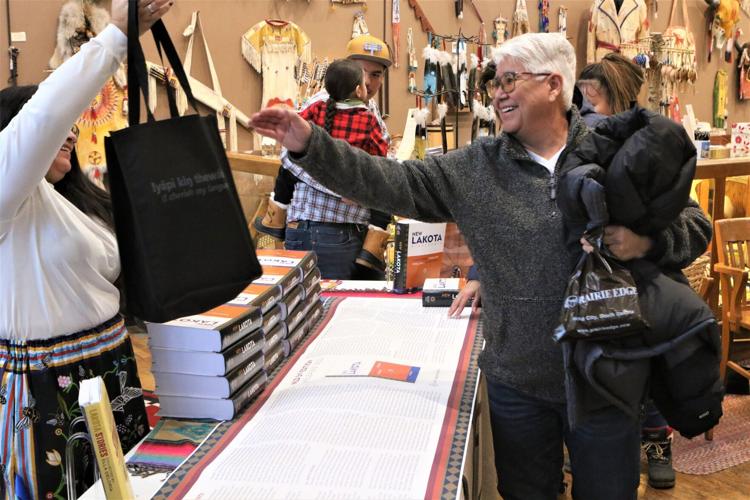Preserving Lakȟótiyapi: Consortium unveils updated Lakota dictionary
Nathan Thompson | Rapid City Journal | December 15, 2022

The Lakota Language Consortium handed out free copies of the updated New Lakota Dictionary on Thursday afternoon at Prairie Edge in Rapid City. The dictionary has 20,000 more entries than the previous version and is now the largest dictionary in North America.
A goal of connecting Lakota youth to the cultural ties of language took a giant step forward Thursday with the unveiling of an updated version of the New Lakota Dictionary at Prairie Edge in downtown Rapid City.
The updated dictionary took years of collaboration with Lakota language experts and Elders, and includes 20,000 more entries than the former edition. More than 400 people contributed to produce the dictionary. The New Lakota Dictionary’s third edition is now the largest Native American dictionary in North America.
Lakota Language Consortium’s goal is to preserve Lakȟótiyapi, the Lakota language, for generations to come. The consortium’s Executive Director Will Meya said the new dictionary is a game-changer in that effort.
“Building a dictionary is fundamentally a community effort, a team effort — something that was started over 30 years ago by some dedicated learners and community members,” Meya said. “We’re just continuing on that same legacy of sharing that has been happening for the last 30 years. There are over 400 contributors to this dictionary and each one of them were trying to leave a legacy for their children and grandchildren.”
LLC’s Deputy Director Alex FireThunder, who is Oglala, said he didn’t grow up speaking Lakȟótiyapi as a first language, but knew some words. He said his mother’s first language was Lakȟótiyapi, but she didn’t teach him and his siblings how to actually speak it.
FireThunder said he was always drawn to the Lakota songs that surrounded cultural ceremonies as a wacipi (powwow) dancer.
“I knew songs but I always wanted to know what they are about and fully understand the songs,” he said. “That was one of my biggest inspirations to begin my own learning journey as a young adult.”
Ten years later, FireThunder said he has been actively speaking and learning Lakȟótiyapi, with the goal of becoming “the best Lakota speaker that I can be.” That passion drives FireThunder with his two young sons, who now speak Lakȟótiyapi as their first language.
FireThunder said the work of the New Lakota Dictionary helped him with the goal of teaching Lakȟótiyapi to his sons as their primary language.
“There are many times my three-year-old son will point at something and ask me what it is in Lakota. Most of the time I know, but in instances where I don’t, I can look it up on my phone and speak it,” he said.
FireThunder said the majority of Lakȟótiyapi first-speakers are typically Elders in their 70s and the language has not been passed down to younger generations. He said that is beginning to change and the updated dictionary will be a vital part in the effort.
“We’re starting to see a lot of young passionate people dedicated to learning the language and teaching the language. We’re seeing a lot of young teachers teaching in the schools,” FireThunder said. “I just saw a room full of young children excited with their families there to support them at the language school.”
Ben Black Bear, Sičháŋǧu Lakȟóta, is the vice chairman of the Lakota Language Consortium. After leading a blessing to Creator in Lakȟótiyapi at Thursday’s unveiling, Black Bear said in the past the use of the Lakota language was used against Indigenous people to “force civilization.”
“If they’re trying to assimilate us, why didn’t they use our language to civilize us? They would have been a lot more successful instead of trying to teach us English and trying to civilize us at the same time using English,” Black Bear said.
“Lakota language is very important and significant. If we used our language to learn about white people and we were allowed to communicate everything new that we’re experiencing in our language — our language would have advanced and we as a people would have advanced a lot quicker than we did.”
Black Bear said the cultural meanings behind Lakota words are very different than English and had different values in Lakota life. He said preserving the language for future generations will bring meaning and understanding back to the Lakota and enhance communication with non-Indigenous people.
“That’s why I got involved in teaching the language and especially developing the language itself, and this is a huge effort,” Black Bear said. “When I first started out all we had were missionary dictionaries, and they were inaccurate and our spelling wasn’t that consistent and there were all kinds of problems… this is the best dictionary that you can find to date.”

